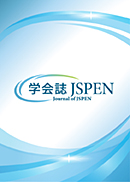Volume 5, Issue 1
Displaying 1-10 of 10 articles from this issue
- |<
- <
- 1
- >
- >|
-
2023 Volume 5 Issue 1 Pages 1
Published: 2023
Released on J-STAGE: August 24, 2023
Download PDF (173K)
ORIGINAL ARTICLE
-
Article type: ORIGINAL ARTICLE
2023 Volume 5 Issue 1 Pages 3-10
Published: 2023
Released on J-STAGE: August 24, 2023
Download PDF (1137K) Full view HTML -
Article type: ORIGINAL ARTICLE
2023 Volume 5 Issue 1 Pages 11-20
Published: 2023
Released on J-STAGE: August 24, 2023
Download PDF (458K) Full view HTML -
Article type: ORIGINAL ARTICLE
2023 Volume 5 Issue 1 Pages 21-28
Published: 2023
Released on J-STAGE: August 24, 2023
Download PDF (445K) Full view HTML
CLINICAL EXPERIENCE
-
Article type: CLINICAL EXPERIENCE
2023 Volume 5 Issue 1 Pages 29-35
Published: 2023
Released on J-STAGE: August 24, 2023
Download PDF (818K) Full view HTML
CASE REPORT
-
Article type: CASE REPORT
2023 Volume 5 Issue 1 Pages 37-41
Published: 2023
Released on J-STAGE: August 24, 2023
Download PDF (622K) Full view HTML -
Article type: CASE REPORT
2023 Volume 5 Issue 1 Pages 43-47
Published: 2023
Released on J-STAGE: August 24, 2023
Download PDF (1267K) Full view HTML
RESERCH REPORT
-
Article type: RESERCH REPORT
2023 Volume 5 Issue 1 Pages 49-53
Published: 2023
Released on J-STAGE: August 24, 2023
Download PDF (596K) Full view HTML
-
2023 Volume 5 Issue 1 Pages 55
Published: 2023
Released on J-STAGE: August 24, 2023
Download PDF (546K)
Retraction
-
2023 Volume 5 Issue 1 Pages i
Published: 2023
Released on J-STAGE: September 04, 2023
Download PDF (478K)
- |<
- <
- 1
- >
- >|
